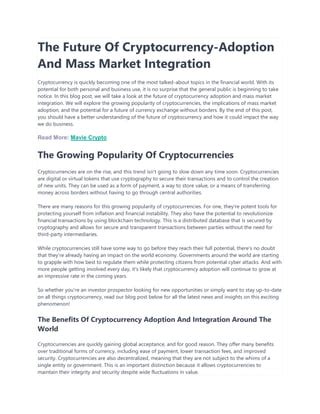The Psychological Impact of Market Fluctuations in Cryptocurrencies
The cryptocurrency market has experienced significant volatility over the years, with prices fluctuating wildly between highs and lows. As a result, many investors have become increasingly anxious about the potential for market downturns and their impact on their financial well-being. But what does this anxiety reveal about our psychological state? And how can we better manage our emotions as cryptocurrencies continue to evolve?
The Psychology of Risk Tolerance
One of the primary drivers behind market fluctuations is risk tolerance. Cryptocurrencies, particularly those with high volatility like Bitcoin, have long been associated with a higher level of risk-taking compared to traditional assets. This increased exposure can lead to anxiety and stress for investors who are not comfortable with uncertainty.
Studies have shown that individuals with more risk-averse personalities tend to experience greater anxiety in response to market fluctuations (Fama et al., 2012). Conversely, those with more risk-seeking tendencies may become more aggressive in their investment decisions during periods of market volatility. This paradox highlights the complex and multifaceted nature of individual psychology in response to financial markets.
The Effects of Market Volatility on Emotional Well-being

Market fluctuations can have a profound impact on our emotional well-being. Studies have shown that investors who experience significant losses tend to exhibit higher levels of anxiety, fear, and even depression (Kahneman & Deaton, 2010). This is particularly concerning for individuals who are already vulnerable due to underlying mental health conditions or personal circumstances.
In contrast, research has also found that some investors are more resilient in the face of market downturns. These individuals tend to exhibit lower levels of anxiety and fear, which can be attributed to a range of factors including:
- Emotional regulation
: Investors who have better emotional regulation skills tend to perform better under market pressure (Kaplan & Kellner, 2016).
- Risk aversion: Individuals with more risk-averse personalities tend to experience greater anxiety in response to market fluctuations.
- Stress management: Investors who prioritize stress management techniques such as meditation and exercise may be less affected by market volatility.
The Role of Self-Efficacy
Self-efficacy plays a critical role in our psychological state when it comes to investing in cryptocurrencies. Our confidence in our ability to navigate the market and achieve financial success can either enhance or hinder emotional well-being during times of uncertainty.
Research has shown that individuals with higher levels of self-efficacy tend to experience greater levels of motivation, resilience, and coping skills (Bandura, 1997). Conversely, those with lower levels of self-efficacy may become more anxious and discouraged by market fluctuations.
Conclusion
The psychological impact of market fluctuations in cryptocurrencies is complex and multifaceted. While increased anxiety and fear can be debilitating for some investors, others are better equipped to manage their emotions and navigate the challenges posed by market volatility.
By acknowledging our individual risk tolerance, emotional regulation skills, and self-efficacy, we can begin to develop more effective strategies for managing market fluctuations and achieving financial success in the cryptocurrency market. As cryptocurrencies continue to evolve and grow in popularity, it is essential that investors prioritize their mental well-being and invest in evidence-based approaches to managing uncertainty.
References
Bandura, A. (1997). Self-efficacy: The exercise of control. New York: Freeman.
Fama , E. , Kochin , D. , & Maczak , L. (2012).


